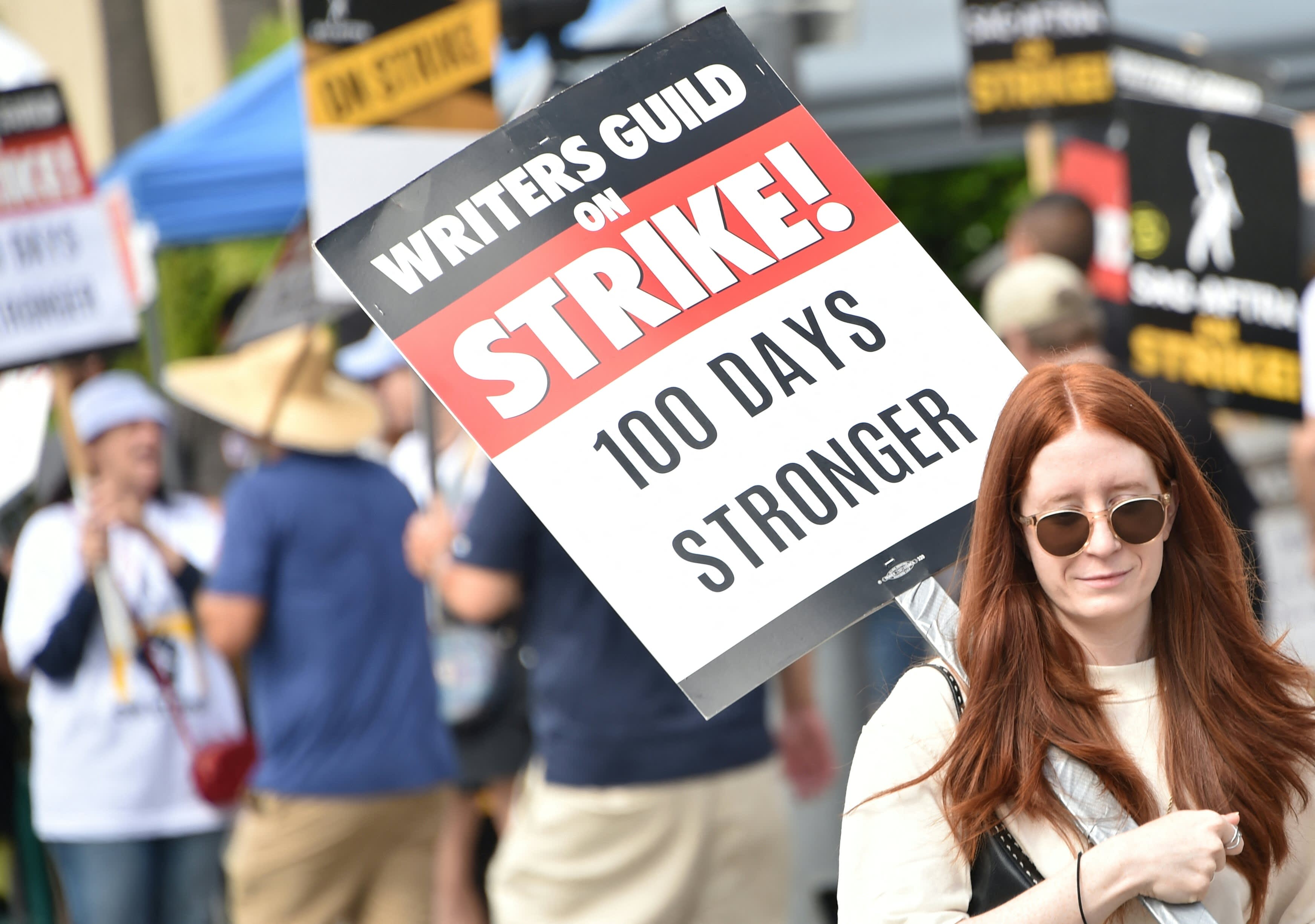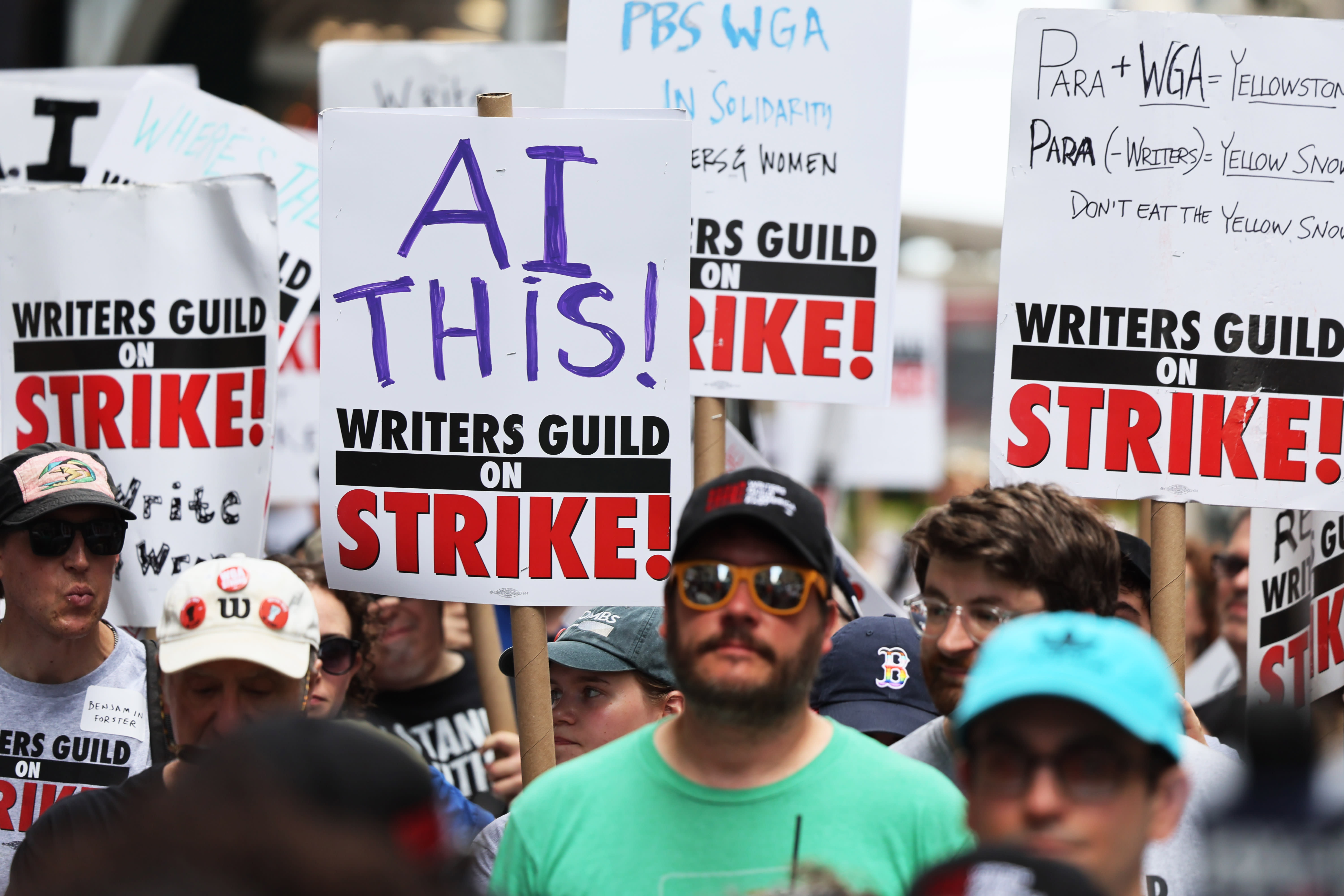A tentative deal has been reached in the nearly 150-day strike by Hollywood screenwriters that ground film and TV productions to halt, the Writers Guild of America (WGA) and Alliance of Motion Picture and Television Producers (AMPTP) announced in a joint statement Sunday.
The tentative agreement was reached after negotiations between striking writers and studios resumed Sept. 20. The talks were the first in about a month between the two sides, raising optimism that an end was in sight to pickets that brought film and television productions to a stop in Hollywood.
“WGA has reached a tentative agreement with the AMPTP,” the guild said in an email to members. “This was made possible by the enduring solidarity of WGA members and extraordinary support of our union siblings who joined us on the picket lines for over 146 days.”
The two sides were divided on issues of pay, the size of writing staffs on shows and the use of artificial intelligence in how scripts are created. Neither side has revealed details on what the deal covers.
The late-September meetings between the WGA and leaders of the Alliance of Motion Picture and Television Producers were the first since mid-August. The two sides issued a joint statement indicating talks will resume, a positive sign after negotiations stalled for about a month.
“Certainly, it’s significant that there was a joint press release,” said Jonathan Handel, an entertainment lawyer. “These are people who have been at each other’s throats in the past.”
The proposed solution to the writers strike came after talks resumed on Wednesday or the first time in a month. Chief executives including Bob Iger of Disney, Ted Sarandos of Netflix, David Zaslav of Warner Bros. Discovery and Donna Langley of NBCUniversal reportedly took part in the negotiations directly.
It was reached without the intervention of federal mediators or other government officials, which had been necessary in previous strikes.
The strike, which began May 2, brought production on several high-profile shows and films, including Netflix’s “Stranger Things,” Disney and Marvel’s “Blade,” and Paramount’s “Evil,” to a stop.
Actors, who joined the writers on strike in July, have their own issues but there have been no discussions about resuming negotiations with their union yet.
It was the first time the two groups had been on strike together since 1960. In that walkout, the writers strike started first and ended second. This time, studios opted to deal with the writers first.
The combined strikes made for a pivotal moment in Hollywood as creative labor faced off against executives in a business transformed and torn by technology, from the seismic shift to streaming in recent years to the potentially paradigm-shifting emergence of AI in the years to come.
Screenwriters had traditionally gone on strike more than any other segment of the industry, but had enjoyed a relatively long stretch of labor peace until spring negotiations for a new contract fell apart. The walkout was their first since 2007 and their longest since 1988.
Reactions
The Screen Actors Guild-American Federation of Television and Radio Artists (SAG-AFTRA) congratulated WGA on its tentative deal.
“While we look forward to reviewing the WGA and AMPTP’s tentative agreement, we remain committed to achieving the necessary terms for our members.
Since the day the WGA strike began, SAG-AFTRA members have stood alongside the writers on the picket lines. We remain on strike in our TV/Theatrical contract and continue to urge the studio and streamer CEOs and the AMPTP to return to the table and make the fair deal that our members deserve and demand.”
In a statement, California Gov. Gavin Newsom said he was grateful for the tentative deal that was reached.
“California’s entertainment industry would not be what it is today without our world class writers,” the governor’s statement said. “For over 100 days, 11,000 writers went on strike over existential threats to their careers and livelihoods — expressing real concerns over the stress and anxiety workers are feeling. I am grateful that the two sides have come together to reach an agreement that benefits all parties involved, and can put a major piece of California’s economy back to work.”
Los Angeles Mayor Karen Bass echoed that sentiment:
“After a nearly five-month long strike, I am grateful that the Writers Guild of America and the Alliance of Motion Picture and Television Producers have reached a fair agreement and I’m hopeful that the same can happen soon with the Screen Actors Guild. This historic strike impacted so many across Los Angeles and across the nation,” the mayor’s statement said. “Now, we must focus on getting the entertainment industry, and all the small businesses that depend on it, back on their feet and stronger than ever before.”
Comcast is the parent company of NBCUniversal and CNBC. NBCUniversal is a member of the Alliance of Motion Picture and Television Producers.
This story uses functionality that may not work in our app. Click here to open the story in your web browser.



0 Comments